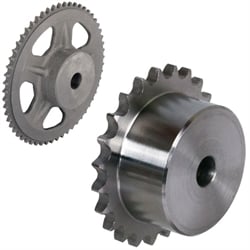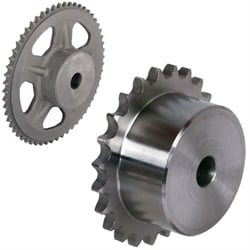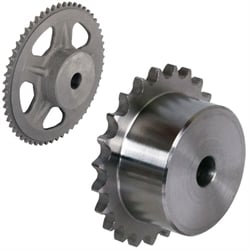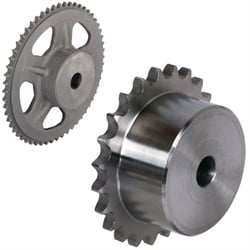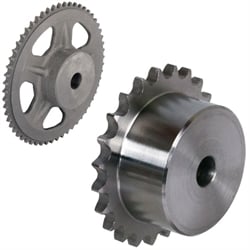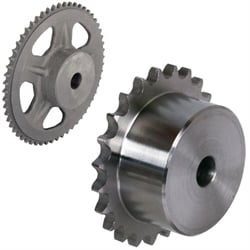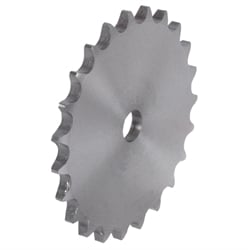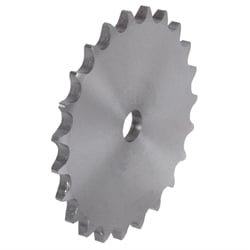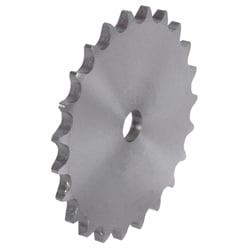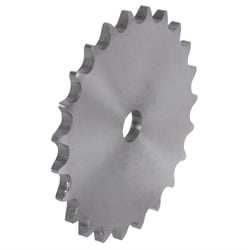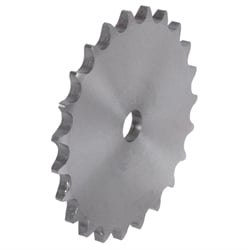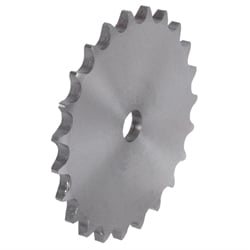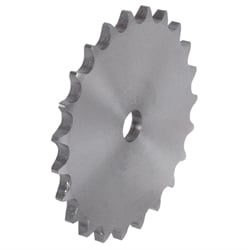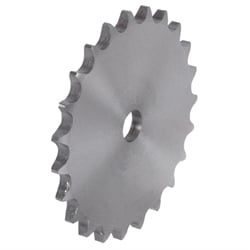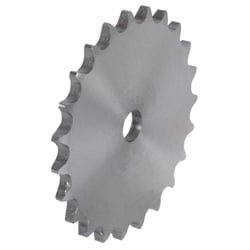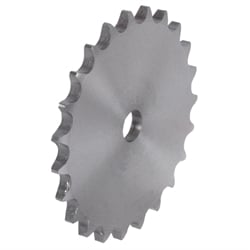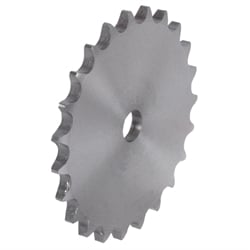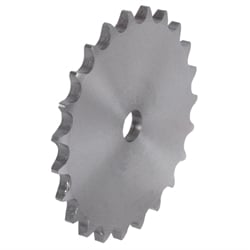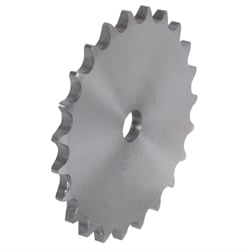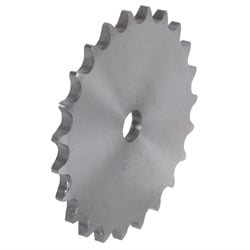Sprocket and Chain
Description
When used properly, high quality roller chains are powerful and reliable drive systems. They can serve to bridge large centre distances. Various transmission ratios can be realized, independently of the centre distance. In Europe mainly roller chains according to DIN ISO 606 (formerly DIN 8187) are used.
Dimensioning and Efficiency
The calculation can be made with this tool : MÄDLER - Tools (eassistant.eu) or refer to page 41 or refer to the e-catalogue to determine a chain drive. With proper lubrication the degree of efficiency is approx. 98 %.
Note regarding the Breaking Load
The DIN ISO 606 (formerly DIN 8187) specifies the minimum breaking load for each chain size. When this breaking load is exceeded, the chain is destroyed. Roller chains should be loaded with no more than one sixth of the stated breaking load, to avoid an early plastic deformation (permanent elongation).
Mounting and Maintenance
The shafts must be set in parallel. The sprockets must be aligned. The slack span should amount to approx 1% to max 2% of the centre distance. For this purpose we recommend mounting a chain tensioner. Large centre distances require a support (guide rail) to be used.
Chain drives must always be well lubricated. Lubricants and lubrication methods depend on the specific application.
Determining the Chain Length
The chain length can be stated in meter or mm, or by stating the number of links. In the latter case, inner and outer links are counted. The chains are usually delivered open. The last link on both ends is an inner link. This leads to an uneven number of links. If a straight connecting ling is used, the closed chain strand has an even number of links. An uneven number of links in a closed strand can only be realized by using a cranked link.
Note: this link reduces the load bearing capacity of the chain by 20%.
Some products in this category
| Products | ||
|---|---|---|
|
10714000
Maedler Sprocket KRS with hub 12 B-1 3/4x7/16" 40 teeth material steel |
||
|
10714500
Maedler Sprocket KRS with hub 12 B-1 3/4x7/16" 45 teeth material cast iron |
||
|
10715700
Maedler Sprocket KRS with hub 12 B-1 3/4x7/16" 57 teeth material cast iron |
||
|
10717600
Maedler Sprocket KRS with hub 12 B-1 3/4x7/16" 76 teeth material cast iron |
||
|
10718300
Maedler Sprocket KRS with hub 12 B-1 3/4x7/16" 95 teeth material cast iron |
||
|
10718800
Maedler Sprocket KRS with hub 12 B-1 3/4x7/16" 114 teeth material cast iron |
||
|
10720800
Maedler Plate wheel KRL without hub 12 B-1 3/4x7/16" 8 teeth material steel |
||
|
10720900
Maedler Plate wheel KRL without hub 12 B-1 3/4x7/16" 9 teeth material steel |
||
|
10721000
Maedler Plate wheel KRL without hub 12 B-1 3/4x7/16" 10 teeth material steel |
||
|
10721100
Maedler Plate wheel KRL without hub 12 B-1 3/4x7/16" 11 teeth material steel |
||
|
10721200
Maedler Plate wheel KRL without hub 12 B-1 3/4x7/16" 12 teeth material steel |
||
|
10721300
Maedler Plate wheel KRL without hub 12 B-1 3/4x7/16" 13 teeth material steel |
||
|
10721400
Maedler Plate wheel KRL without hub 12 B-1 3/4x7/16" 14 teeth material steel |
||
|
10721500
Maedler Plate wheel KRL without hub 12 B-1 3/4x7/16" 15 teeth material steel |
||
|
10721600
Maedler Plate wheel KRL without hub 12 B-1 3/4x7/16" 16 teeth material steel |
||
|
10721700
Maedler Plate wheel KRL without hub 12 B-1 3/4x7/16" 17 teeth material steel |
||
|
10721800
Maedler Plate wheel KRL without hub 12 B-1 3/4x7/16" 18 teeth material steel |
||
|
10721900
Maedler Plate wheel KRL without hub 12 B-1 3/4x7/16" 19 teeth material steel |
||
|
10722000
Maedler Plate wheel KRL without hub 12 B-1 3/4x7/16" 20 teeth material steel |
||
|
10722100
Maedler Plate wheel KRL without hub 12 B-1 3/4x7/16" 21 teeth material steel |
||
| Product | DESCRIPTIOn |
PICTURE |
|---|---|---|
Would you like to get your best price or more information about this product?
Machine builders or engineering companies can request a login via the link below or contact us immediately.
Are you a private customer?
The manufacturer or importer of your machine probably has the necessary parts. We therefore recommend contacting them first.
